On the ground at London’s Palestine protest

Around 100,000 people gathered in Central London to demand a ceasefire in the conflict.
Society
Words: Darshita Goyal
Photography: Noorunisa
On Saturday 21st October, it’s estimated that 100,000 people gathered in Central London to show support for Palestine and to call for an end to the bombardment of Gaza. Draped in the flags and keffiyeh scarves, the crowd marched from Marble Arch through Piccadilly Circus and towards Whitehall before massing at Downing Street.
The National March for Palestine was organised by several groups to demand an end to Israeli bombing of Gaza, following an attack by Hamas on Israel earlier this month. Over 4,741 Palestinians are reported to have been killed in retaliation for the atrocities, which resulted in the death of 1,400 Israelis on 7th October.
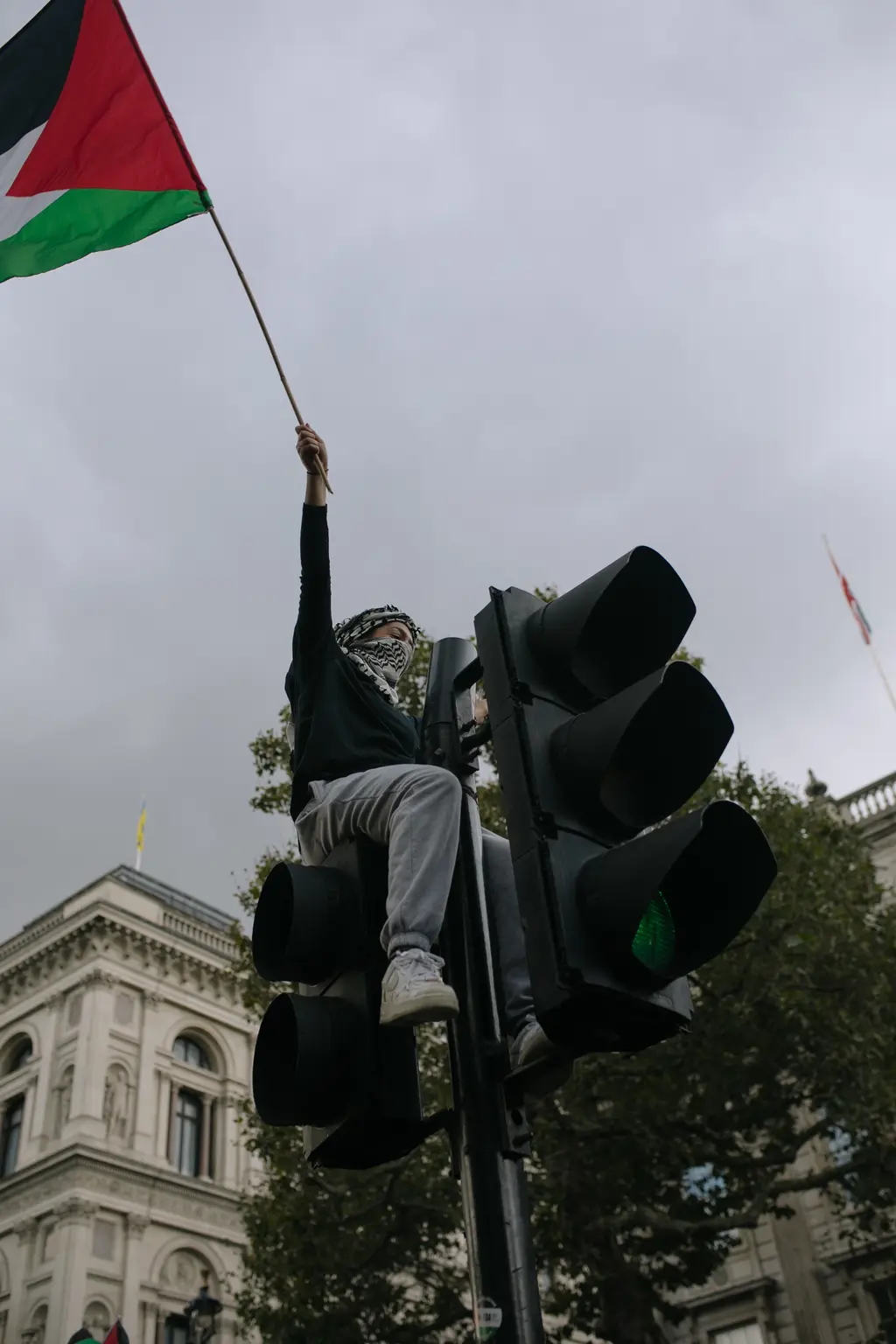
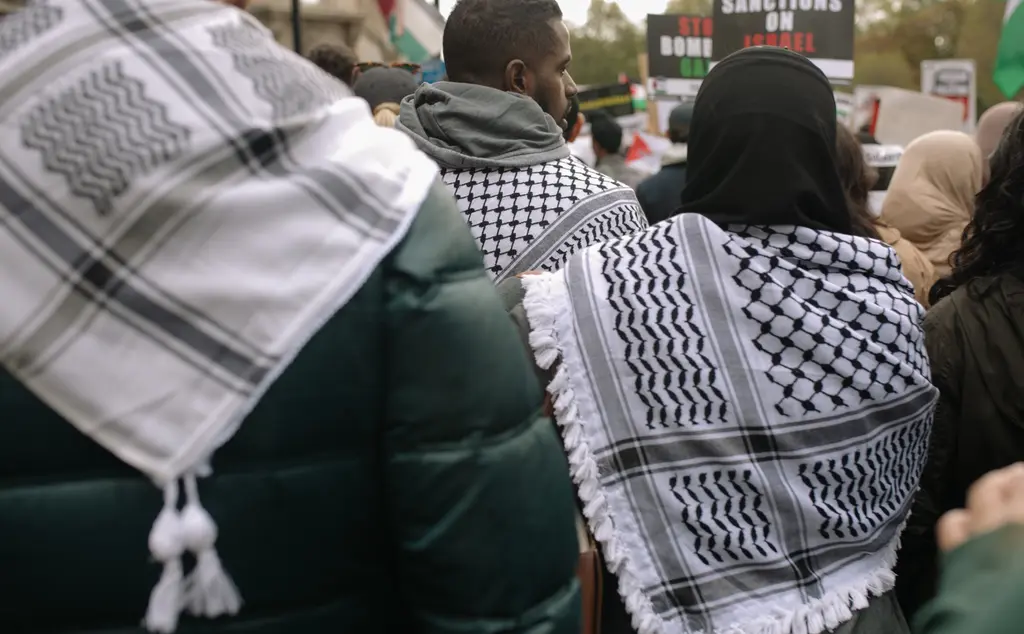
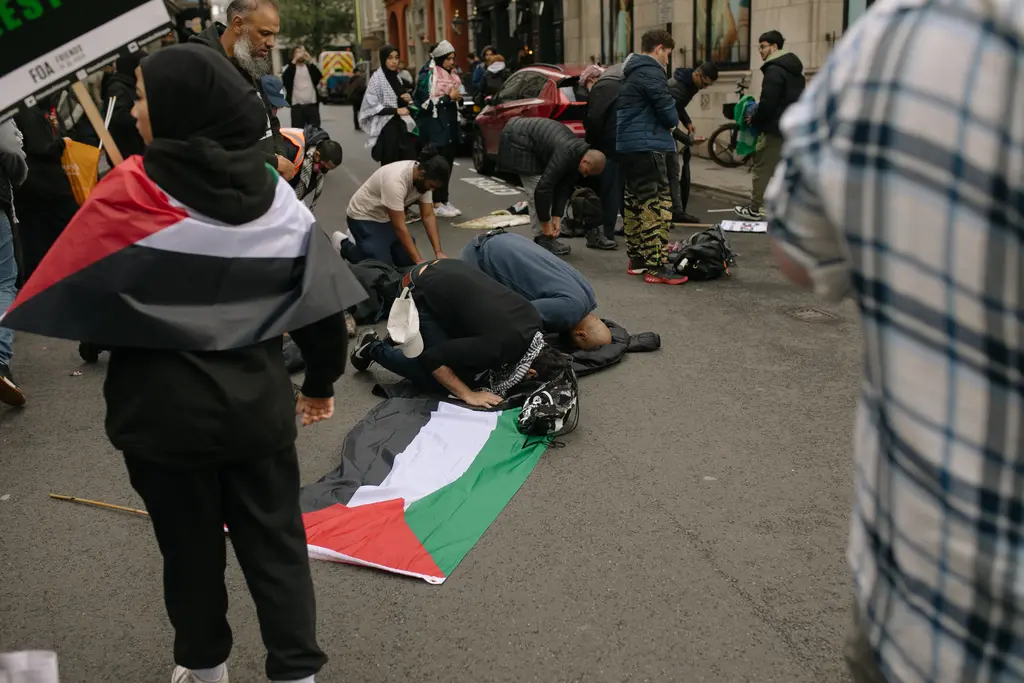
Tasneem Abdul, 16

What do you think of the UK government’s response to what’s happening?
The government’s response to what’s happening is disgusting. Rishi Sunak, you do not speak for us, you only speak for a very small minority. The truth is that Israel is killing Palestinians – it’s not a complex issue, it’s genocide. The people of London stand with Palestine.
What are your thoughts on Scotland’s call for the UK to accept Palestinian refugees?
There’s two sides to that: the good thing is that obviously we want the Gazans to be safe. But what happens when all the people of Gaza leave? Does Israel take over everything and does Palestine just cease to exist? Obviously we’ll do everything we can to keep the Palestinians safe, but what happens when there’s no country left?
Anonymous, 25

Photography by Noorunisa
Why did you decide to attend the march today?
As a Jew, it’s important for me to be here today because a lot of my family have experienced genocide. The way that the community responds to any threat is a trauma response: safety by any and all means. It’s a hard thing to challenge in a community like ours because there’s genuine trauma, whether that’s from Holocaust survivors or people who were expelled from North Africa and the Middle East. But at the end of the day, if that trauma response is what shapes us, we should also be able to see that that’s exactly what the Palestinian people are experiencing right now. It’s up to us to change the way that we respond and challenge our community, because what’s happening presently is completely immoral. Standing up and stepping out to fight for people’s rights, and breaking out of a cycle of violence is very important.
What can people do to help?
I think it’s OK to start with small steps. We exist in a time when moral purity prevails and people are afraid to accept that they were wrong. But I actually think it’s completely OK to start fresh: step away, discard our own trauma and ask certain questions. Do I think bombing a hospital is okay? [Israel denies the strike on al-Ahli Arab Hospital.] Do I think expelling people from their land is a good idea? Do I think peace can be effectively achieved on stolen land? If it wasn’t such a personal thing, you’d obviously say no. It’s fine to make a mistake, but you can only continue to make mistakes for so long before you start being the real problem. So stop and really think, instead of being caught up in the emotions of it all.
Goub, 33

Why did you decide to attend the march today?
I’m Palestinian and multiple members of my family are dead right now, while others are still trapped under rubble. We don’t know if they’re alive or not and that’s why I’m speaking.
What are your thoughts on Scotland’s call for the UK to accept Palestinian refugees?
It’s amazing but I don’t think that’s the solution. What do you mean refugees? Just give us our fucking country back. We don’t need refugee camps, we need our country.
Jei, 26

Why did you decide to attend the march today?
It’s important to show solidarity with a historic moment. As a young person, I grew up in the shadow of 9/11 and the Iraq war, and that’s something that everyone promised would not happen again. But it’s happening again. I feel a responsibility to show up in solidarity with fellow Middle Easterners and the oppressed in the world.
Can you tell us about the sign you’re holding?
I’m here with [activist organisation] Queer Bloc and we’re showing up against the pinkwashing of Israel. [There is a narrative that attempts to] justify Israel’s violence against Palestine by saying that Hamas are homophobic and they kill gay people, and so that justifies their occupation and genocide. But we’re not buying that. As queer people we recognise the oppression of other communities. The bombs in Gaza aren’t dodging gay people and Israel is not the saviour for gay Palestinians. The only thing that can save them is freedom. I just think it’s bullshit, really. As queer people we ask for solidarity from other people in their movements and so we should show up in solidarity for other oppressed people and have visibility for the Queer Bloc.

Fawziyah Rahman, 30

Why did you decide to attend the march today?
The violence and oppression that Palestinians have been going through for a long time feels more significant right now, because there’s a global awareness, particularly from the diaspora of previous colonies. People are realising this is a colonial battle and the diaspora who have felt this trauma and have the scars of colonialism are here to stand up for Palestinians. It is a pain we all relate to.
What can people do to help?
Just don’t be silent, because being silent is being complicit.
Can you tell us about the sign you’re holding?
I made this yesterday. I’m currently doing my MA in art and science and I have access to workshops. With the present situation, I don’t feel like I can work on other stuff so I decided to paint and carve this. In some ways, it’s related to my dissertation because I’m looking at counter culture and protests are a form of counter culture. “End the occupation” rings true to all colonies. What’s happening right now is invader settler colonialism. It’s apartheid and it needs to stop.
Khadijah Hussain, 15

Why did you decide to attend the march today?
It’s important to support the people of Palestine.
What could people be doing to help?
Donating, raising awareness, writing to the government and telling them to help the people in Palestine. They could do a lot more, especially Rishi Sunak – just be honest about what’s happening. People are dying.
How does social media impact and influence what’s happening?
Social media has actually covered a lot. There’s a lot of video evidence of what’s happening in Palestine and it’s really important to see the brutality and not just hear it to make it real for people.
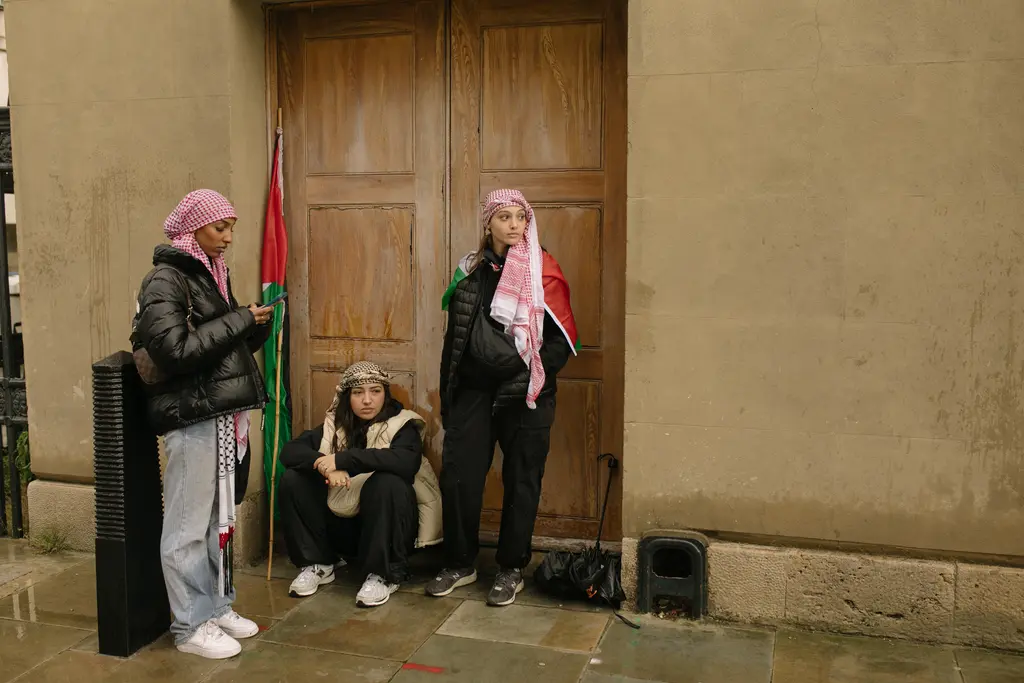
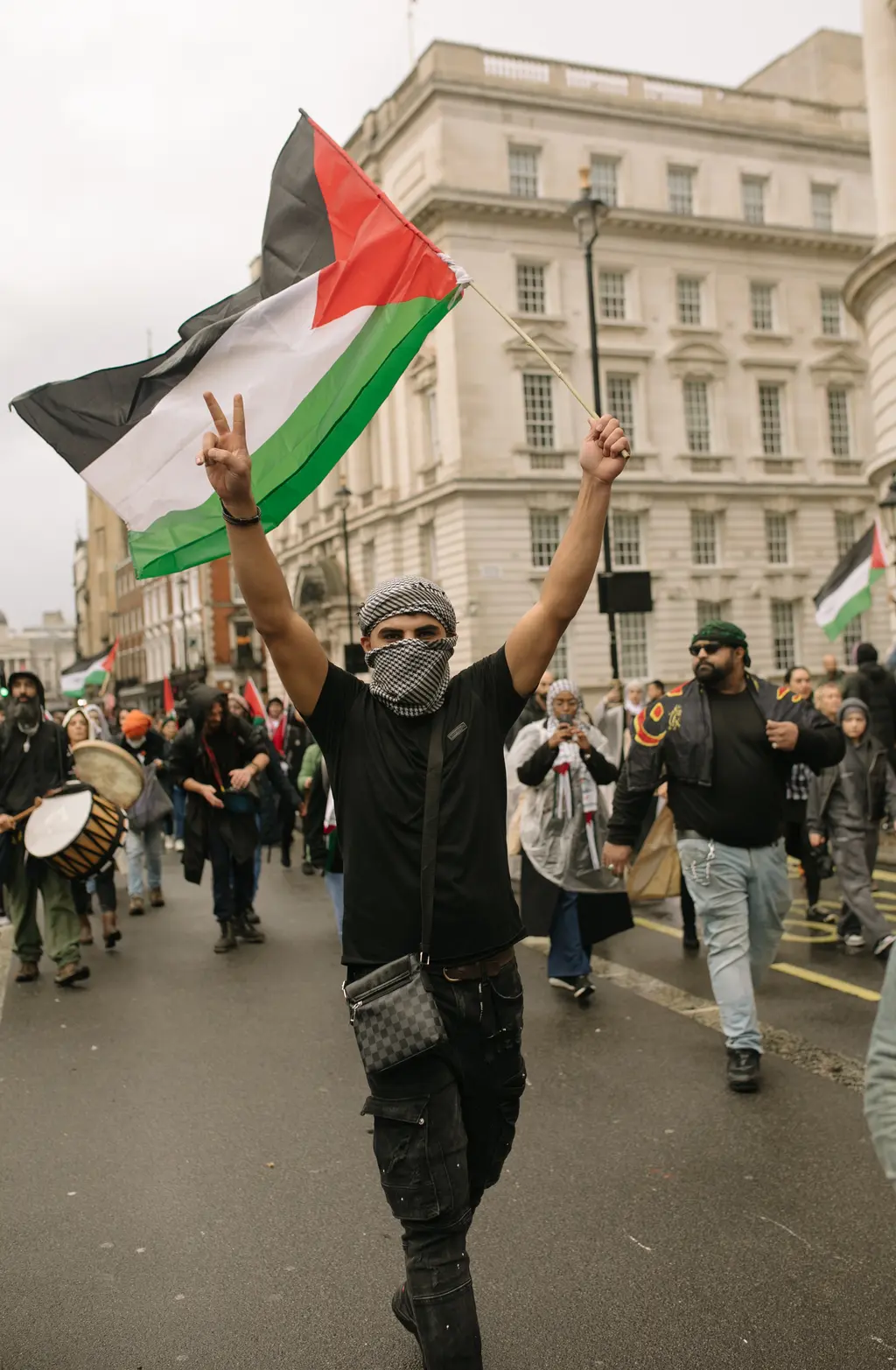
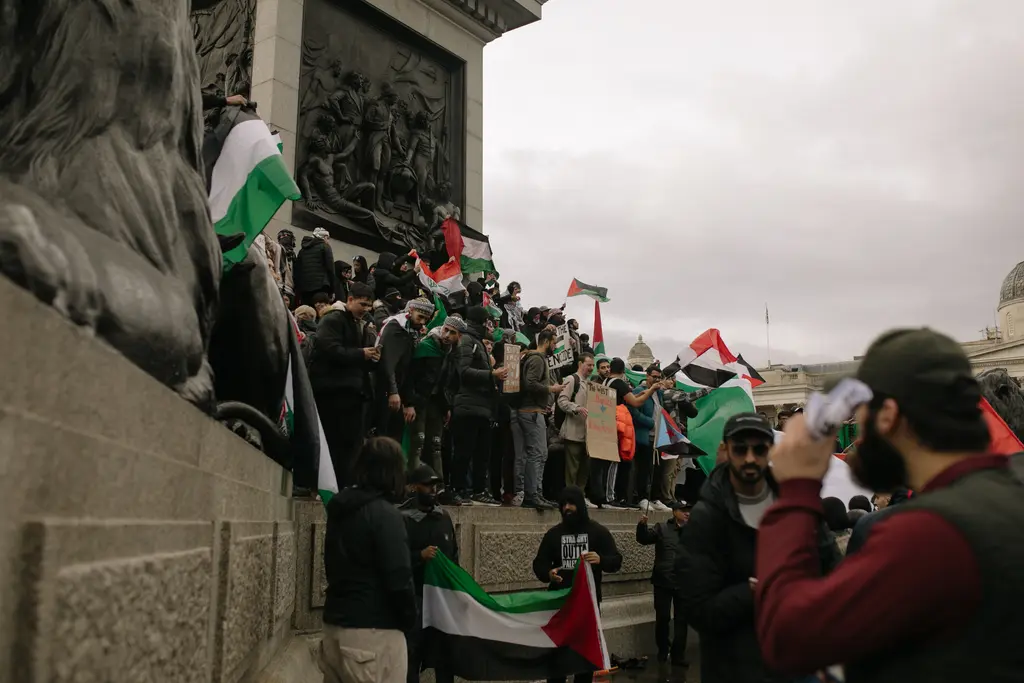
Anonymous, 28

Why did you decide to attend the march today?
I’m Iranian and I’m aware of how much the regime in Iran is manipulating the countries in the Middle East and causing instability just to stay in power. So it was important for me to come and show that, as Iranians, we are standing with Palestinians, despite what our regime says.
How does social media impact and influence what’s happening?
The media is biassed, but social media has been very helpful. From what I can see, there’s a lot of support for Palestinians and I hope they can see that they’re not alone.
Anonymous, 24
Why did you decide to attend the march today?
Showing solidarity when the narrative in the news is relatively one sided is important. I’m here for the people of Palestine.
Angus McNelly, 30

Why did you decide to attend the march today?
What’s going on in Palestine at the moment is genocide. Palestine has always been about the breach of human rights, apartheid and Western settler colonialism. It’s important that you have hundreds and thousands of people saying “not in our name”, and standing in solidarity with the people.
You are walking as part of the Academics Bloc. Why is it important for academics to be here?
Academics are social scientists. Our role is to critically analyse what’s going on in society and why it’s happening. For that reason alone, if you’re an academic with an interest in social sciences and social justice, you should be here.
How does social media impact and influence what’s happening?
The dominant media narrative has been so appalling and one-sided that actually social media has become one of the few places where you can hear Palestinian voices.







